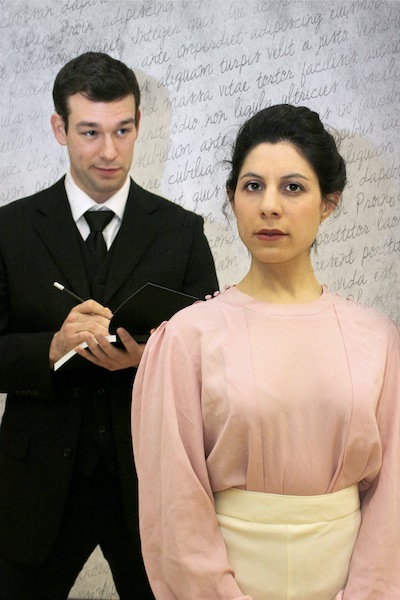Left to right are Kaila Kask (Mary Phagan), Emily Smith, Rachel Garnet and Alina Quarin with Riley Sandbeck (Leo Frank). (photo by Allyson Fournier)
On Aug. 17, 1915, 31-year-old Leo Frank was kidnapped from the Georgia State Penitentiary in Milledgeville by a Ku Klux Klan lynch mob and hanged by his neck until he was dead. His alleged crime: the rape and murder of 13-year-old factory worker Mary Phagan. His real crime: being Jewish, successful and a northerner in an impoverished Deep South still reeling from the humiliation of the Civil War and looking for retribution against its perceived oppressors.
The case has been the subject of novels, plays, movies and even a mini-series. But who would have thought that you could make a musical out of such a tragedy. Author Alfred Uhry (Driving Miss Daisy) and Broadway producer Hal Prince (Cabaret) did. Thus Parade was born, with music and lyrics by Jason Robert Brown. It opened on Broadway in 1998, won two Tonys and went on to be produced across America to much acclaim.
Now, Fighting Chance Productions, a local amateur theatre company, is bringing this compelling story to Vancouver audiences for its Western Canadian première at the Rothstein Theatre April 14-29. Director Ryan Mooney and lead actor Advah Soudack (Lucille) spoke with the Jewish Independent about the upcoming production. But first, more background, because it is an incredible story.
Frank was a slight man – five feet, six inches tall, 120 pounds – with a nervous temperament. Born in Texas and raised in Brooklyn, he graduated from Cornell University with a degree in mechanical engineering and was enticed to move to Atlanta in 1908 to run the factory owned by his uncle. There, he met and married Lucille, a 21-year-old woman from a prominent Jewish family. The newlyweds lived a life of privilege and wealth in a posh Atlanta neighbourhood, Frank became the president of the local B’nai B’rith chapter. However, having been brought up in the vibrant Yiddish milieu of New York, he always felt like an outsider amid the assimilated Southern Jewish community.
The journey to his tragic demise started the morning of Saturday, April 26, 1913, when little Mary put on her best clothes to attend the Confederate Memorial Day Parade in downtown Atlanta. On the way, she stopped at the National Pencil Factory, where Frank was the superintendent, to pick up her weekly pay packet from his office. That was the last time she was seen alive. Her body, half-naked and bloodied, was found in the basement of the factory later that day. Shortly after, Frank was arrested by the police and charged with the crime along with the African-American janitor, Jim Conley.
The trial was a media circus fueled by a zealous district attorney, Hugh Dorsey, who was looking for a conviction in a high-profile case to popularize his bid for the governorship of Georgia, and Tom Watson, a right-wing newspaper publisher who wrote virulent, racist editorials against Frank, casting him as a diabolical criminal and calling for a revival of the Klan “to do justice.” Frank was convicted by an all-white jury on the testimony of Conley – who had turned state’s evidence in exchange for immunity – and sentenced to death in a trial that can only be characterized as a miscarriage of justice replete with a botched police investigation, the withholding of crucial evidence, witness tampering and perjured testimony. This was America’s Dreyfus trial and Frank was the scapegoat.
The conviction appalled right-thinking people and mobilized Jewish communities across America into action. William Randolph Hearst and New York Times publisher Adolph Ochs campaigned on Frank’s behalf. The conviction and sentence were appealed. Georgia governor John Slaton was lobbied to review the case. For two years, Frank sat in jail not knowing his fate until, one day, he heard that Slaton had commuted his death sentence to life in prison. In response, frenzied mobs rioted in the streets and stormed the governor’s mansion. A state of martial law was declared and the National Guard called out to protect the city. Against this backdrop, Frank was transferred into protective custody at the state penitentiary but that did not stop the lynch mob, some of whom had been jurors at the trial.
It wasn’t until 1986 that Frank was (posthumously) pardoned by the Georgia State Board of Pardons and Paroles.
Jewish Independent: What attracted you to this play?
Ryan Mooney: Parade has been a favourite musical of mine for as long as I can remember. I was drawn to it because it is such a fascinating story, it speaks so much to its time and continues to speak to us. When people see it, they will want to know more. It has beautiful soaring music, is very emotional, but also it is real, so relatable. It will take you on a journey that will touch you in many ways.
Advah Soudack: The songs, the music. When I was going through the script and getting used to the music, I could not get through some of the songs without choking up, it was so emotional, beautiful and real.
JI: How would you classify it as a theatrical piece?

RM: It is, in essence, a love story about a young man and a woman who learn through tragic circumstances to have a deeper love for each other and to appreciate each other’s kind of love.
AS: Leo sees love as a service, being a provider, while Lucille looks for love in spending quality time together and physical intimacy. Over time, their two loves unite.
JI: This isn’t your typical musical. It has a very dark side. It covers the kind of subject matter usually covered in narrative plays. Do you think people want to see this kind of musical theatre?
RM: Our company, as our name states, takes chances and we are taking a chance on this, but I think the risk is worthwhile and that audiences will appreciate the story. It seems to do very well wherever it plays – Broadway, London. We thought the Rothstein Theatre would be the perfect venue and we hope that the Jewish community will support us.
JI: Is this strictly a Jewish story?
RM: It is not necessarily just a Jewish story, it could be about anybody, anywhere. It is a fascinating look at a historic event through a musical lens. I don’t think Prince was trying to make a political statement when he produced the show but rather to educate people about the event. At the time of its first production, 1998, shows like Ragtime and Showboat were on Broadway alongside Parade. It seemed to be a time for examining how mainstream America treated those people it considered lesser citizens.
JI: What was it like to cast?
RM: The production requires a large cast: 25. I needed people who could sing and act. Lots of people auditioned and we ended up with a great cast, with the members spanning the ages of 18 to 60. What makes this show very relevant is that we have actors playing roles for their real ages, not trying to be someone younger or older, and that makes the production more realistic. I wanted at least one of the leads to be Jewish and Avdah was perfect for the role of Lucille.
AS: When I heard about this show, I jumped at the chance to apply. I had been out of theatre for about 10 years and I really wanted to get back into it. I was lucky enough to get a callback after my first audition and felt very proud of my performance the second time around. I was thrilled when I got the role.
JI: What is it like to deal with a true event as opposed to a fictional account?
RM: Because it is a real life story, there is so much more research you can do to make sure you get it right. I read Steve Oney’s And the Dead Shall Rise: The Murder of Mary Phagan and the Lynching of Leo Frank and gave it to members of the cast to read to get a feel for the characters and some background information. There is some material that did not make it into the musical but the play does essentially honour the accuracy of the event.
AS: I am reading the book right now and it is so fascinating to get the story behind the character and be able to use that as an actor.
JI: How are Leo and Lucille portrayed in the script?
RM: He is not portrayed that sympathetically. At the trial, he is really cold and does not look repentant but, ultimately, we see him break. If he were just shown as a martyr and everyone else a villain, that would not be interesting for the audience. Instead, the audience sees his flawed human character and that is why it is a great story to tell – [he’s] a person with faults that anyone can relate to.
AS: She is a Southern woman and a product of the American melting pot, more assimilated than Jewish, and that is how she survives. America wants you to become American first and everything else second. People like her thought like that and assimilated. Then, she is thrust into this case, where horrific things are being said against her husband on a daily basis in the newspapers and she has to deal with that. Yet, she stands by him and is one of his biggest supporters. She even went to the governor’s mansion to personally lobby him to intervene in the case. For a young Southern Jewish woman, that was a big step. So, you see her grow into this strong, independent woman.
She comes across very strong in the play, perhaps stronger than she really was in real life, but she was so committed to Leo’s cause and to him. She came every day to jail to visit him and bring him food. The circumstances of the tragedy allowed her the opportunity to become a heroine.
JI: What will the staging be like?
RM: The set is a long wall with platforms set at different levels. The lights will move through the different levels from scene to scene to create more of a cinematic flow, more like a movie than live theatre. We did not want the story’s flow to be interrupted by the audience clapping after every song. Of course, we do hope the audience will give a standing ovation at the end of the show.
JI: What do you expect audiences to take away from the musical?
RM: I want them to walk out with questions and want to look up more information about the case, but I also want them to leave with the understanding that all good art finds the grey in life and that everything is not black and white. One of the biggest issues in America today is the mentality that you are either with us or you are against us. The world is going in that direction and it is a hard place to be. You have to be able to see issues from all angles if you want to see any positive growth. There are some ambiguities in the show but there are also strong life lessons about the dangers of prejudice and ignorance.
For tickets to Parade, visit fightingchanceproductions.ca.
Tova Kornfeld is a Vancouver freelance writer and lawyer.

